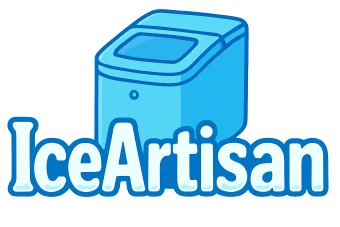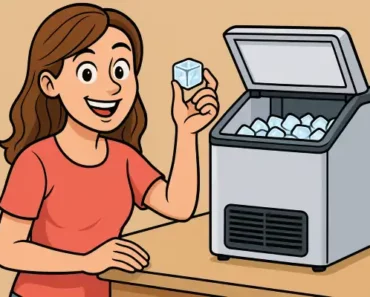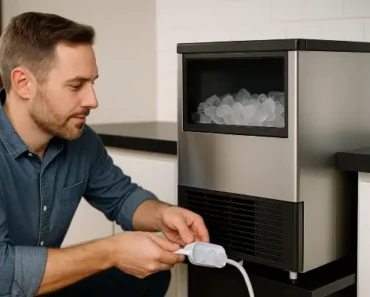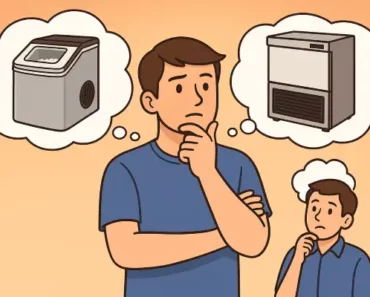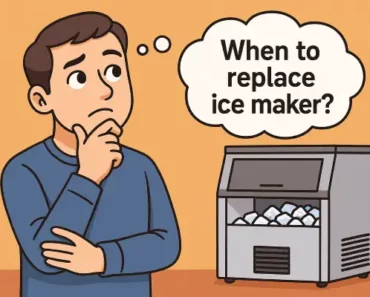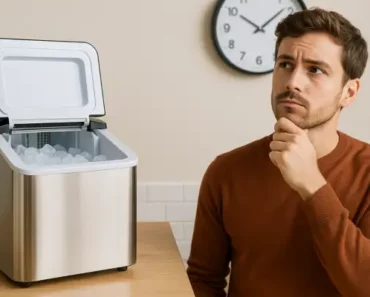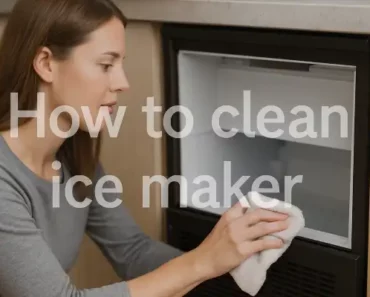Sometimes, you may wonder: “Why does my ice maker smell bad?” It is a very common question when you check the ice trays inside your refrigerator, but it is a serious matter when it comes to ice makers. Refrigerators that lose seal often have food odors to contaminate the ices, but in the ice maker, there is no food. Yes, the cause is mostly bacterial growth, mold spores, and mineral deposits.
Water inside inactive ice makers becomes a breeding ground for bacteria, especially in humid environments. That’s why I always recommend to know how to clean ice maker regularly. If you are lazy enough to clean your ice maker, at least make sure you know how to drain an ice maker properly.
I’ve made a comprehensive “Ice Maker FAQ” series collecting all common ice maker problems to help Ice Artisan readers quickly troubleshoot their ice maker units.
- ⚖️ Countertop vs undercounter ice makers
- 👍 Are portable ice makers worth it?
- ⚡ How much electricity does an ice maker use?
- 💧 Does an ice maker use a lot of water?
- 🪣 Do ice makers need to be drained?
- 🚫 Can ice makers cause water damage?
- 🚰 Do ice makers need water lines?
- 🔊 Are countertop ice makers loud?
- 😭 Do ice makers make a lot of noise?
- 🔗 Are countertop ice makers safe?
- ⛺ Can ice makers be used outdoors?
- 🔌 Can ice makers be left running all the time?
- 🚗 Can ice makers be used in RV?
- 🗄️ Can ice makers be installed in cabinets?
- ❄️ Do portable ice makers keep ice frozen?
- 🛠️ Can ice makers be used in garages?
- 📄 Do ice makers store ice?
- 🚀 How do ice makers make ice so fast?
- 💡 How does ice maker work?
- 🎰 How does a commercial ice maker work?
- 🛠️ How to install an undercounter ice maker?
- ❄️ How to make clear ice in ice maker?
- 🪣 How to increase ice production in ice maker?
- ⏳ How long does an ice maker take to make ice?
- 🔗 When to replace ice maker filter?
- ⏱️ When to replace ice maker?
- 💡 How to clean ice maker?
- 😭 Why does my ice maker smell bad?
- 🫗 How to drain an ice maker?
- 🪣 How to unclog an ice maker?
- 🔗 How do I unstick my ice maker arm?
- 💧 How to fix ice maker leaking water?
- ❄️ Why is my portable ice maker making too much ice?
- 🥵 Why is my ice maker hot?
- 🔌 What happens if you don’t turn off the ice maker?
- 🧊 How to fix ice maker not making ice?
Ice Artisan‘s best picks
Why does my ice maker smell bad?
Your ice maker smells bad because standing water inside creates a perfect home for bacteria and mold, which produce bad odors that get trapped in your ice cubes. Most of my readers are using a countertop ice maker, and not all countertop units have the self-cleaning feature. As a result, water tends to stay firm inside the ice maker. At least remember to drain your ice maker whenever you want to turn off the appliance.
It could be affected by the mineral deposits, especially in the areas with hard water. These mineral deposits create irregular surfaces where bacteria can attach and hide from casual cleaning attempts. The interaction between minerals and organic materials sometimes produces hydrogen sulfide gas -responsible for the distinctive “rotten egg” smell some ice makers develop over time.

Undercounter ice makers has better drainage system, which can eliminate the residual water inside the ice maker. These appliances are also made mainly for businesses, which need ice constantly, so there will be less water residual inside the storage. Still, make sure you clean ice maker regularly, to help avoid the bacteria growth inside the ice storage.
The rubber gaskets and seals found in both countertop and undercounter ice makers harbor bacteria in their microscopic spaces. These components, essential for proper ice maker operation and electricity efficiency, create hiding spots invisible to the naked eye. It is just like the gasket around your washing machine, which also get mold after long use.
Some modern ice makers feature anti-microbial components or integrated cleaning systems that help a lot in preventing mold and bacteria. Especially in the high-end undercounter ice maker, even after decade of running, it never shows a sign of mold. Still, even these advanced technologies require manual cleaning to maintain optimal performance and odor-free operation.
Conclusion
Regular maintenance prevents unpleasant odors in all ice maker types. By understanding where moisture collects and implementing consistent cleaning routines, both homemakers and business owners can avoid bacterial growth problems. The minimal effort required for proper maintenance sometimes can make clear ice in your ice maker for you. Your maintenance ensures your ice maker works better and improves your drinking experience.
